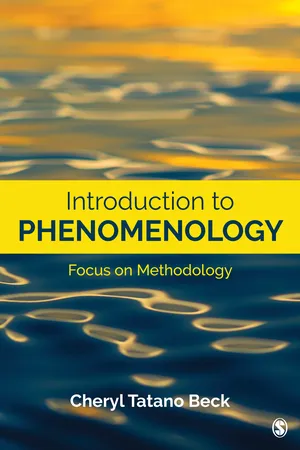
- English
- ePUB (mobile friendly)
- Available on iOS & Android
About this book
Phenomenology is a challenging method for many students to understand and apply. Introduction to Phenomenology: Focus on Methodology breaks down the history, methodology, and application so students can more easily write proposals and conduct phenomenological research. Author Cheryl Tatano Beck draws on her depth of experience in applying and teaching phenomenological methods to distill the method into a single guidebook for students and new researchers alike. This introductory book provides a clearer picture of phenomenology as method and its applications to social, behavioral, and health sciences, covering both interpretive and descriptive phenomenology from research design through analysis.
This book is divided into four parts. Part I briefly provides the philosophical underpinnings of descriptive and interpretive (hermeneutic) phenomenology, summarizing the main goals of the original texts. Part II focuses on descriptive phenomenology, while Part III concentrates on interpretive phenomenology. Each type of methodology is covered in its own chapter, with tables comparing the methodologies to one another so readers can better understand the differences and similarities. Part IV addresses evaluating, writing, and teaching phenomenology. Unique chapters on writing a proposal, getting your study published, developing a research program, and preparing to teach phenomenology help complete the cycle of research and help graduate students transition from student to researcher to teacher. Appendices provide study activities for students and examples of two types of phenomenological proposals.
Frequently asked questions
- Essential is ideal for learners and professionals who enjoy exploring a wide range of subjects. Access the Essential Library with 800,000+ trusted titles and best-sellers across business, personal growth, and the humanities. Includes unlimited reading time and Standard Read Aloud voice.
- Complete: Perfect for advanced learners and researchers needing full, unrestricted access. Unlock 1.4M+ books across hundreds of subjects, including academic and specialized titles. The Complete Plan also includes advanced features like Premium Read Aloud and Research Assistant.
Please note we cannot support devices running on iOS 13 and Android 7 or earlier. Learn more about using the app.
Information
Table of contents
- Cover
- Half Title
- Acknowledgements
- Title Page
- Copyright Page
- Contents
- Detailed Contents
- List of Tables and Figures
- Acknowledgments
- About the Author
- Publisher Note
- 1 Introduction
- PART I Philosophical Underpinnings of the Methodology
- 2 Philosophy of Phenomenology
- PART II Descriptive Phenomenology
- 3 Paul Colaizzi’s Descriptive Phenomenological Methodology
- 4 Amedeo Giorgi’s Descriptive Phenomenological Methodology
- 5 Adrian van Kaam’s Descriptive Phenomenological Methodology and Clark Moustakas’s Modification
- 6 Karin Dahlberg’s Descriptive Phenomenological Reflective Lifeworld Research
- PART III Interpretive Phenomenology
- 7 Max van Manen’s Hermeneutic Phenomenological Approach
- 8 Patricia Benner’s Interpretive Phenomenological Methodology
- 9 Jonathan Smith’s Interpretive Phenomenological Analysis
- 10 Karin Dahlberg’s Hermeneutic Reflective Lifeworld Research Methodology
- PART IV Evaluating, Writing, and Teaching Phenomenology
- 11 Trustworthiness in Qualitative Research
- 12 Phenomenological Writing
- 13 Developing a Program of Research Using Phenomenology
- 14 Teaching Phenomenology: Preparing Our Next Generation of Researchers
- Glossary
- Appendix A First Study Activity for Students
- Appendix B Second Study Activity for Students
- Appendix C Mothers’ Experiences of Posttraumatic Growth Following Traumatic Childbirth: A Descriptive Phenomenological Study Proposal
- References
- Appendix D The Impact of Traumatic Birth on Mothers Caring for Their Children: An Interpretive Phenomenological Study Proposal
- References
- Index